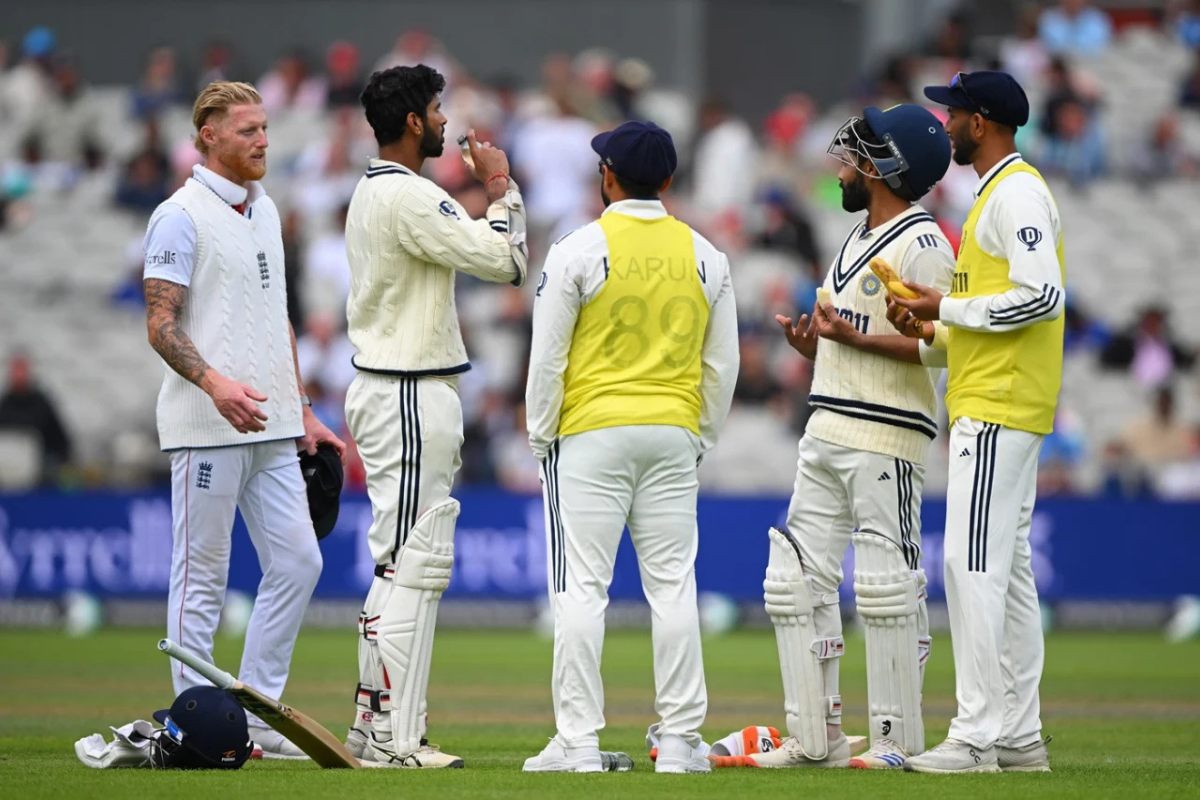

They refused to walk off. He offered it. One side wanted rewards for their efforts. The other wanted rest. And somehow, everyone walked away grumpy.
The fourth Test at Manchester ended in a draw, but it felt anything but settled. India, on the back of Ravindra Jadeja and Washington Sundar’s unbeaten centuries, ensured the series stayed alive heading into The Oval. But the bigger talking point wasn’t the cricket, it was the vibe. Sour, smug, slightly self-important.
Ben Stokes didn’t hide his displeasure at India batting on despite the match drifting towards a stalemate. Gautam Gambhir defended the decision, saying the batters “deserved their hundreds”. Shubman Gill, calm but slightly cold, said the decision to continue was “up to the boys”.
Everyone said the right thing eventually. Everyone eventually shook hands (yes, even Ben Stokes, the footage from the crowd confirms it). Yet somehow, everything felt off.
There’s a pattern emerging. India and England, two of the three teams in the world expected to lead Test cricket because only they can afford to, are increasingly operating with a strange siege mentality. There’s a constant sense that the world is against them. That every fair question is an unfair attack. That leadership means drawing lines, not bridging gaps.
Gambhir, never shy of a verbal duel, now sees disrespect where there’s often just disagreement. Whether it’s defending his selection calls or praising Rishabh Pant’s bravery with a fractured foot, his tone often drips with defiance, as if he’s bracing for backlash even when there isn’t any.
Gill, barely four Tests into his captaincy, is already showing signs of being guarded. When he speaks, it’s polite in a way, sure, but it lacks warmth. There’s rarely acknowledgment, or even a simple “we could’ve done better there.” His leadership so far feels less like a hand on the shoulder and more like an HR email that is functional, clean, yet a bit distant.
And then there’s Ben Stokes, who’s done a lot right for English Test cricket. There’s no doubting his astute captaincy. He’s arguably the best of the modern-day Test captains, and honestly there’s a solid case for him to be one of the best in English cricket ever. But, he wears frustration a little too plainly. His reaction to India not accepting the handshake felt entitled, as if the handshake offer being declined was a gentleman’s pact being broken.
England have done plenty to inject new energy into the way red-ball cricket is played, there’s no doubting that. Bazball’s early swagger and the charisma of their leaders, Stokes and Brendon McCullum, can’t be questioned. But when things don’t go their way, the switch flips quickly.
What they call “spirit of the game” can quickly become moral superiority. They expect the opposition to play along with their tempo, their definition of sportsmanship, their idea of when the game should end. When India declined the offer of a draw in Manchester, the response from England’s side wasn’t just surprise, it was unnecessarily aggressive.
Yes, India were chasing personal milestones, but why wouldn’t they? To lift the team out of a massive hole to draw the Test was a monumental effort. With the next Test just four days away, fatigue is a major factor as Stokes himself highlighted post the game. Why wouldn’t India want to wear out the English out a little more? To expect them to just walk off because the match was done isn’t how elite sport works.
On the other side, India’s leadership group can’t seem to shake the need to constantly explain themselves. It’s as if they’ve internalised the criticism so much that every decision now comes with a preemptive defence.
Take Pant’s injury. Nobody questioned his courage. But once it was confirmed he had a fracture, the conversation naturally shifted to management. Gambhir, instead of addressing that nuance, spoke in sweeping emotional declarations: “Generations will talk about this.” Maybe. But generations might also ask whether pushing a half-fit player was avoidable.
Even Gill’s steady knock in Manchester that was brave, patient and technically sound, was followed by a post-match tone that felt oddly… sterile. Not introspective. Not self-critical. Just… surface-level. When he scowled at the English openers for being 90 seconds late and later went on to defend it in the press, it felt more defensive than aggressive.
This defensiveness, over time, can become a blind spot. You stop hearing the useful feedback. You only hear the noise.
None of this is to say that these are bad leaders. In fact, they’re exactly the kind of people Test cricket needs. They are passionate, ambitious, and invested. But that investment has to come with self-awareness.
When the focus is always on how you’re being perceived, you lose track of how you’re actually performing. When the messaging is always “us vs them,” it builds walls, not cultures.
Test cricket doesn’t need saviours. It needs steady hands. It needs leaders who aren’t always looking to fight, but to listen, adapt, and let the cricket breathe.
ALSO READ:
With one Test to go, the series is still alive. But so is the opportunity for both teams to course-correct. England don’t need to prove they’re the most ethical team in cricket. They aren’t. And frankly, even if they don’t see it yet, the world does. India don’t need to prove they’re misunderstood geniuses. They don’t need to defend their decisions with talk, prove it right on the field.
What both need to prove is that they can evolve beyond this exhausting posture of being wronged. That they can lead with intent, not insecurity.
Because if they can let go of the baggage, these are leaders who might just become the stewards that Test cricket so desperately deserves. Cricket doesn’t need martyrs. It needs grown-ups.
For more updates, follow CricXtasy on Facebook, Instagram, Twitter, Telegram, and YouTube.